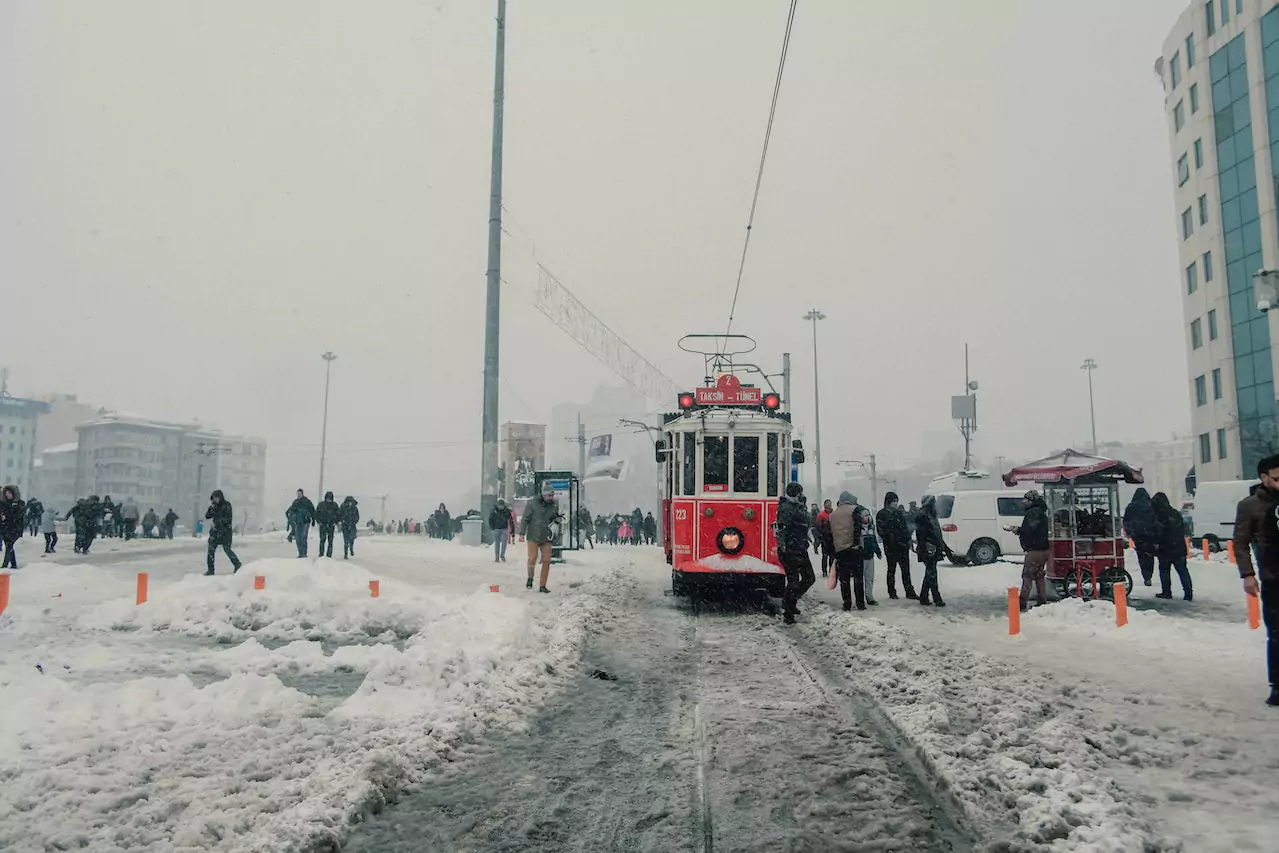Winter in Istanbul: How Visiting Istanbul in Cold Can Be a Great Idea
Fact checked by Yaren Coşkun
No matter what time of year you visit: Istanbul remains beautiful. And when it starts to cover with snow, it becomes even more magical. The cold wintery mix of snow and ice—all share their contributions to making the city stunning and Instagrammable. It’s undeniably a great time to take photos with a scenic background like the Bosphorus.
The winter in Istanbul marks its presence all the way through December to January and last till February with temperatures ranging from 3 to 11 degrees Celsius. But regardless of how cold the city can get in the winter, this pleasant and welcoming weather has advantages for visitors who like to see snow-covered Istanbul!
The experience of visiting Istanbul in winter is something you should definitely not miss! Just make sure to bundle up well before your winter adventure, so you can get ready to see and experience this entirely different side of the city that most tourists miss during summer.
How cold is Istanbul in winter?
Winters in Istanbul, Turkey: The temperature in Istanbul, Turkey during the winter months of “December, January, and February” fluctuates greatly. The long-term forecasts are very unreliable as the weather changes a lot. The maximum you can rely on are the forecasts for 1 or 2 days. And that too may change several times.
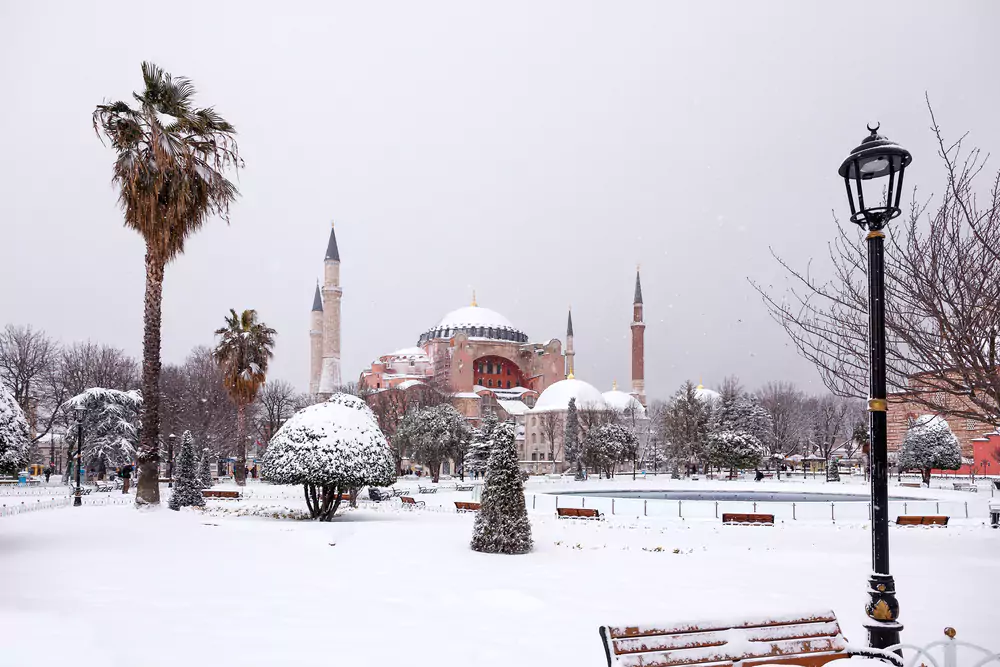
Compared to Europe’s winters, Istanbul offers a relatively milder winter season. It is characterized by frequent showers, chill winds, and sudden bursts of sunshine. Overall, the average temperature in Istanbul during winter can range from 3 to 11 degrees Celsius (about 40–50 degrees Fahrenheit), but subzero (32℉) days are rare.
DECEMBER:
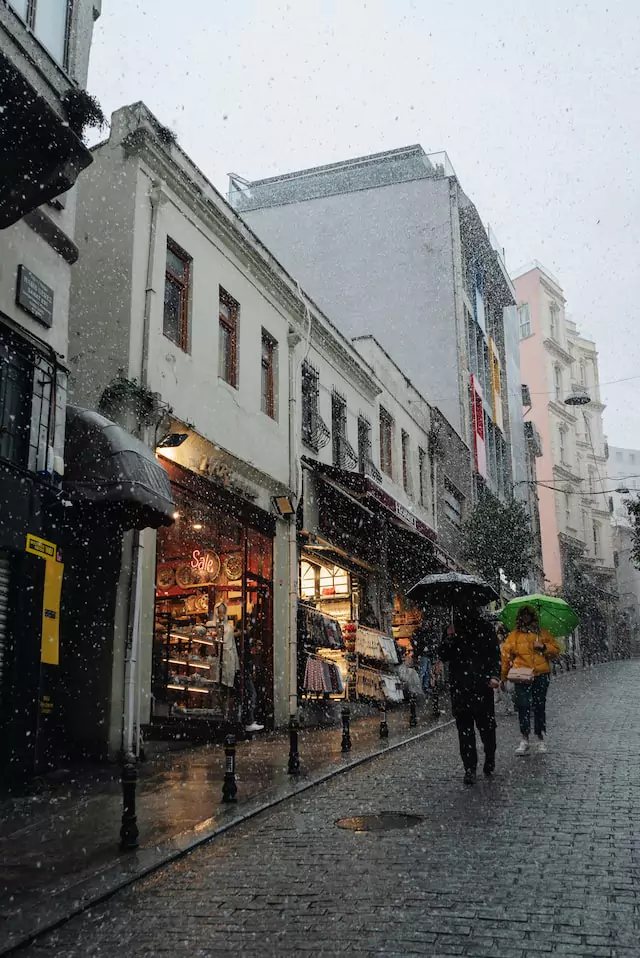
The Istanbul weather in December is a rather comfortable temperature. It ranges anywhere from 5 to 11 degrees Celsius. But bear in mind that the sea nearby brings in a lot of cold wind, and gloomy weather sometimes.
On average, the month receives about 10 to 12 days of sunshine. During the winter season in Istanbul, the days may be on the shorter side, the sun setting earlier in the day at 5:30 sharp.
But embracing this change in atmosphere can be quite refreshing indeed. Curl up with a good book, or take a leisurely stroll through the city.
The city is not as busy at this time, and there are fewer tourists around. If you have some layers of winter clothes and a scarf, sunglasses, and an umbrella packed, you are ready for the winter in Istanbul for the month of December.
JANUARY:
The month of January is generally very gloomy. January in Istanbul is marked by a further drop in temperature, ranging from about 3 to 9 degrees Celsius. It may also drop to sub-zero at times. On average, it rains for about 14 days and hence it feels pretty humid, along with the cold winds. The skies are covered with a dense layer of gray clouds.
It is recommended to carry an umbrella with you at all times, as it may rain anytime unexpectedly. You may also get to see some snow in the early mornings in January. But it’s light snow and melts by the time the day sets in. The hot air balloon rides are mostly canceled as it demands clear skies.
Nonetheless, a lot of the museums and mosques provide an indoor location to explore the city. The hospitality and food are sure to provide you with a lot of warmth.
FEBRUARY:
February in Istanbul is again very unreliable in terms of weather. Sometimes it’s like experiencing all four seasons in one day, which may seem very funny. Temperature ranges anywhere from 3 to 10 degrees Celsius on average. The month experiences around 10 days of sunshine and the cold winds still hit you. By the end of February, Istanbul’s weather begins to change as it witnesses “less precipitation and gloomy days”. You may experience the transition of the weather from winter to spring.
Top reasons why you should not miss visiting Istanbul in winter
Let’s look at the top reasons why you shouldn’t miss out on winter in Istanbul, Turkey.
Cheapest time to travel in Istanbul
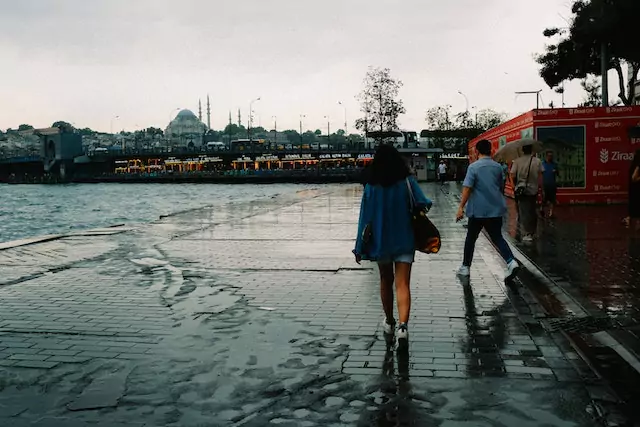
The tourist crowd starts declining from the end of October. This brings down the costs of places to stay, flights, and more. During winter months like December, January, and February, you’ll find great deals no matter if you’re planning a week-long getaway or something longer, like 15-20 days. Bargaining is common in Turkey, so don’t be afraid to negotiate. Discover your ideal accommodation in Istanbul, whether it’s a hotel, an Airbnb, or somewhere else.
Flight prices are also often budget-friendly year-round, plus winter brings big discounts on activities and outings. Not only Istanbul, but locations in Turkey like Cappadocia are easy on the wallet during winter. Visiting a new country doesn’t have to strain your purse if you take advantage of the lower winter costs!
No queuing in the line
Let’s face it, the world has an overwhelmingly large population. And Istanbul is flooded with tourists throughout the year except (you guessed it) “the winters.”
So when you visit any of the famous historical and cultural sites in Istanbul (or in fact anywhere in Turkey), you are less likely to find crazy crowds.
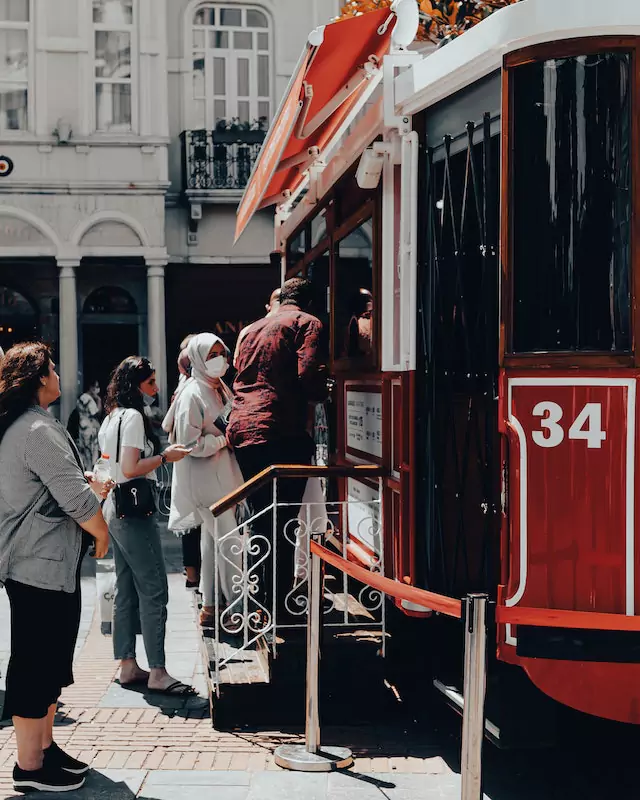
Whether you are thinking of visiting Hagia Sophia, Blue Mosque, Topkapi Palace, or Istanbul Archeological Museum, you can roam around freely outside and inside these famous tourist sites in Istanbul without the insanely huge queue in the morning hours of the winter season. During the off-season in the late fall and winter months, exploring Istanbul and other Turkish destinations can be far more hospitable and cheaper than they are in the tumult of the tourist-filled spring and summertime.
While winter may not be the best time to visit Istanbul due to its freezing weather, it is worthwhile to visit if you are on a tight budget and want to avoid crowds that you may generally see in the summer season. In winter, you can immerse yourself in the culture and try out some of the local delicacies in cafes without having to wait two to three hours long in lines or incur unexpected costs.
Visiting during the off-season allows for a deeper exploration into the Turkish experience that you don’t otherwise get from a vacation during the height of the tourist season.
Winter special food
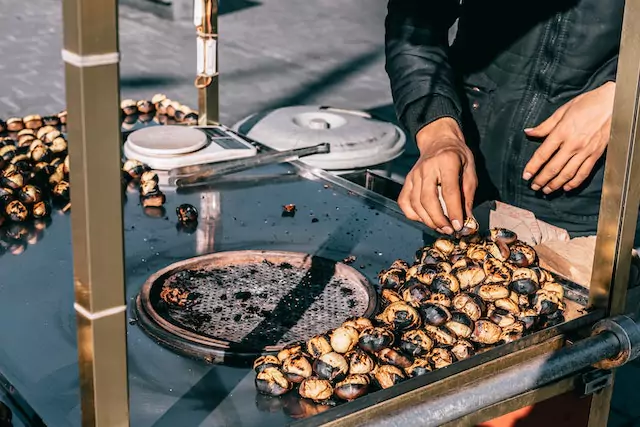
Turkey has to offer a lot of winter-specific foods, which you would probably never have tasted before. Istanbul’s streets are filled with vendors selling roasted chestnuts (Kestane), a wintertime favorite that will give you fiber and keep your stomach full for a few hours. It’s a good snack option to have while you’re sightseeing in Istanbul during winter.
A winter-specific drink is Salep, consumed by itself without anything on the side. Made of tubers and wild orchards, it is a perfect drink to keep the cough and uneasiness of the stomach at bay. Some other drinks include “Boza, Turşu (Pickles Juice), and Çay (Tea)”.
Some well-known winter desserts include Kabak Tatlısı (Pumpkin Dessert) and Ayva Tatlısı (Quince dessert). Kumpir (Baked Potato with fillings) occupies a special place in the memories of the locals and teenagers. It is a filling, yummy, and cheap street food. You may also try Köfte, Kuru fasulye, and many more authentic Turkish foods in Istanbul.
We may go on and on about the authentic foods of Istanbul, but you won’t really get the full flavor if you don’t also experience some of the local cuisines during colder months.
Site-seeing is mostly indoors
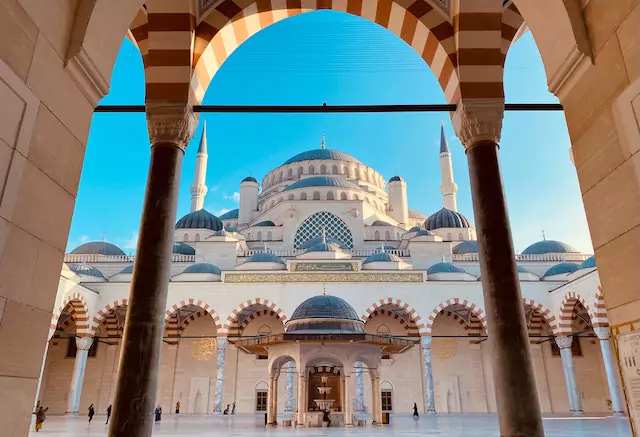
Here’s the good news!
Although there are many outdoor activities to explore in Istanbul, the place is also home to numerous indoor museums, mosques, and underground cities like Basilica Cistern that you can visit. This means that even if the weather is not cooperating, you’d still have plenty of options and reasons to celebrate your time here.

Tourist attractions such as the Grand Bazaar, Spice Bazaar, Hagia Sophia Mosque, Istanbul Archeological Museum, Istanbul Museum of Modern Art, and Turkish Hammams (Indoor baths) are all indoor.
The cold weather outside can be warmed up by going to a Turkish coffeehouse nearby, followed by a bath at the Hammam. However, the Turkish bath may not be something that all of you are interested in during winter.
If museums are not your thing or you simply wish to indulge in some activities while in Istanbul, you must experience a Turkish Cooking Class or go for some Wine Tasting. And you cannot miss the chance to see The Sufi Whirling Dervish Show at the Hodjapasha, a unique performance that combines the beauty of chants of “Allah”, music, and dance with mesmerizing whirling dervish performances. It is sure to make your trip an unforgettable experience.
The iconic Turkish coffee
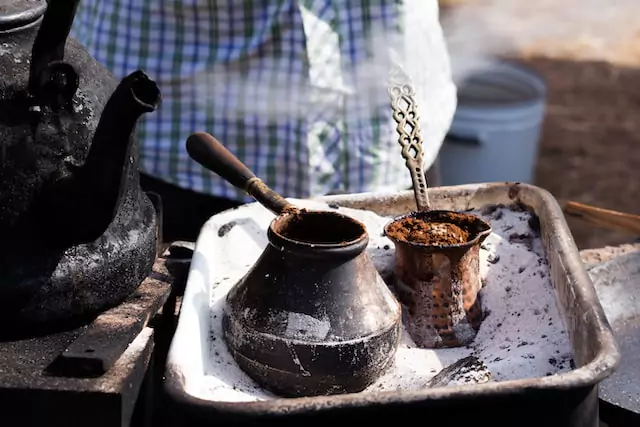
There is a famous Turkish saying…
“To drink one cup of coffee together guarantees forty years of friendship“
The tradition of “Turkish coffee” is now a part of the UNESCO List of Intangible Cultural Heritage of Humanity. The Turkish tradition of coffee brewing dates back to the 15th Century Ottoman Empire. Served hot from a special coffee pot called “cezve“, Turkish coffee is an integral part of the culture. It often serves the purpose of conversation setters and accompanies marriage arrangements, traditional fortune-telling activities, prayer, and hospitality customs.
The coffee houses have become meeting spaces for the people to come together and debate on socio-political issues, art, literature, and culture. It brings people together in one of the most interesting ways.
What makes Turkish coffee so special to most tourists is its unique taste and brewing art. Made with “finely ground Arabica beans”, it has a total of “six levels of sweetness”. It has a thick consistency and a uniquely strong and distinct taste, which might stun the first timers a little bit. You may also find some places near the Spice Bazaar of Istanbul that serve Turkish coffee cooked on the hot sand, and observing the process will surely leave you in a state of awe.
Best time to indulge in some shopping
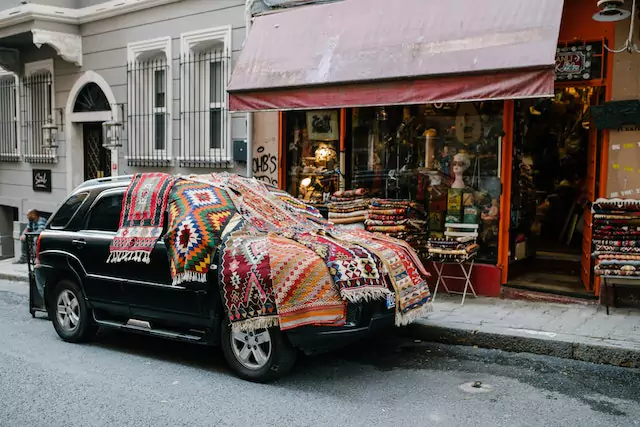
The winter season in Istanbul calls for a lot of shopping. You are sure to find a lot of cheap but great deals, especially from mid-December to the mid of January in Istanbul. Thinking about hopping carpet shops in Istanbul!? Make sure you visit shops like Vezirhan Carpets and Ethnicon/Dhoku Carpets as they have a multi-generational tradition of weaving supreme quality carpets and also offer free shipping. Oh! The Grand Bazaar at the heart of Istanbul is one place you can’t afford to miss.
With over 62 lanes and about 4,000 shops, you can find everything here: from clothes to edible items to home décor—all with the touch of Turkish culture and art. The architecture that hosts the Grand Bazaar is a 15th-century trade center and is itself a piece of art. The Indulgent experience of the Egyptian Spice Bazaar in Istanbul is a must.
Located in the Yeni Camii (New Mosque) Complex in Istanbul, the market is filled with domes of vibrant colored spices, each one of them luring you towards itself. You may consider getting your hands on some authentic Turkish spices such as Sumac, Nar Eksisi, or Corek Out in order to take your Turkish experience back home.
Taste the divine wine

What’s better than a cold day to go wine tasting in Istanbul!? From authentic Turkish grapes like Emir, Kalecik Karası, Narince, and Öküzgözü to Western varieties like Chardonnay, Malbec, and Tempranillo, there are plenty of options to explore.
You can take a day trip out of the city or get on a cruise ship for a few hours. There are many wine tours available in Istanbul. From the Bosphorus Dinner Cruise with Turkish Show to Full-Day Guided Wine Tour, these tours will take you away from the hustle and bustle of the city for some quality time with nature.
You can also embark on a wine-tasting adventure in Istanbul and discover the rich 4,000-year-old tradition of wine culture. Your guided tour begins at the Istanbul Archeology Museum, followed by a visit to the vineyards, where you’ll learn about different wine varieties.
Next, explore the vine repository before culminating in a wine-tasting session featuring a range of delicious wines. The perfect juxtaposition of cold weather and the warmth of wine will make this tour a divine experience. A delightful trip like this is a must-have on your itinerary when visiting Istanbul in winter!
- For Educational Purposes Only: The information presented here is for educational purposes and should not be considered as a substitute for professional, medical, or lifestyle advice. Always seek the advice of a qualified professional for specific travel, lifestyle, or health-related questions. Users are encouraged to conduct their own research and professional consultation before making any decision or action.
- Subject to Change: Details such as hotel rates, travel recommendations, and lifestyle suggestions may change over time. Please verify the current information and availability before planning your trip or making lifestyle changes.
- No Endorsement or Guarantee: Any recommendations or endorsements made in this article are based on the author’s opinions and experiences. This does not guarantee the same experience for all readers.
- Accuracy Not Guaranteed: Efforts have been made to ensure the accuracy of the information provided. However, no warranty is made regarding the completeness, accuracy, or reliability of the content.
- Legal and Regulatory Variations: Travel regulations, local laws, and lifestyle norms can differ across regions and change over time. Readers are encouraged to familiarize themselves with local laws and regulations when traveling or adopting lifestyle changes.
